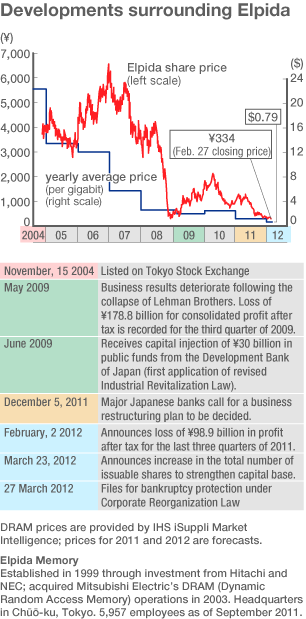
Collapse of Elpida Tarnishes Hopes for Industrial Policy Revival
Economy- English
- 日本語
- 简体字
- 繁體字
- Français
- Español
- العربية
- Русский
 Elpida Memory, known as Japan’s premier semiconductor business, filed for bankruptcy protection at the end of February under Japan’s Corporate Reorganization Law. Elpida is seeking to restructure its business with support from the Ministry of Economy, Trade, and Industry. This is a painful setback for Japan’s industrial policy, and the taxpayer will have to foot some of the bill because Elpida is a national policy enterprise.
Elpida Memory, known as Japan’s premier semiconductor business, filed for bankruptcy protection at the end of February under Japan’s Corporate Reorganization Law. Elpida is seeking to restructure its business with support from the Ministry of Economy, Trade, and Industry. This is a painful setback for Japan’s industrial policy, and the taxpayer will have to foot some of the bill because Elpida is a national policy enterprise.
Back in the 1980s Japan had more than a 70% share of the global semiconductor market. But starting in the early 1990s many Japanese companies abandoned their semiconductor operations in the face of worsening business conditions, as competition from Taiwan and South Korea heated up and prices fell. It was against this backdrop that Elpida was established in 1999 through the integration of NEC’s DRAM business with that of Hitachi—a merger strongly backed by the Ministry for International Trade and Industry (METI’s predecessor). In 2003, Elpida took over Mitsubishi Electric’s DRAM business to become Japan’s top DRAM manufacturer. However, financial difficulties persisted and a loss of nearly ¥180 billion was reported in the third quarter of 2009, as the global economy teetered following the collapse of Lehman Brothers.
METI’s “Helping Hand” Approach Backfires
It was METI that extended a helping hand to Elpida. As part of the revision to the Act on Special Measures Concerning Industrial Revitalization, a mechanism was introduced for the Development Bank of Japan to invest in businesses that had insufficient capital, conditional upon joint investment by private enterprise, and for the government to cover 80% of any losses that occured. Elpida was the first business to benefit from this investment scheme when it received ¥30 billion from the DBJ. Countering those who were lukewarm on the initiative or urged caution, METI insisted that DRAM was extremely important to Japanese people’s lives and the national economy.
For METI, the collapse of Lehman Brothers became a foothold toward restoring industrial policy. The old MITI had exercised leadership and control over the Japanese economy from the post–World War II recovery through to the high-growth period that followed. The ministry’s influence over industry waned from the 1990s onward, as economic globalization and the internationalization of Japanese businesses brought demands for the relaxing of regulations.
However, the recent financial crisis, widely ascribed to a “failure in markets,” has led to reassessment throughout the world of the proper role of governments. The US government was investing public funds not only in financial institutions but also in automobile manufacturers, setting out a “Green New Deal” industrial policy. And with the growth of the Chinese economy and other factors, there was also a growing debate on the advent of greater competition among nations.
Against this background, the revision to the Industrial Revitalization Law was one of the industrial policies that METI set forth. But things have been brought to a halt with the “failure in government” seen in the collapse of Elpida. What is more, a high-ranking METI official who played a key role in the scheme to assist Elpida was arrested on suspicion of insider trading of its shares and indicted. This scandal has invited nothing but distrust of industrial policy.
It was unreasonable to use government intervention to try and maintain Elpida’s technical dominance in DRAM, a general-purpose product for which it is difficult to do so. Even in this area targeted for expansion, and previously so critical to Japan’s economic growth, the industrial policy setbacks have become obvious.
Japan in the past approached foreign heads of state in a bid to sell nuclear power plant technology, but the Fukushima nuclear disaster last year has led the Democratic Party of Japan to make a policy shift away from nuclear power. Meanwhile, with regard to solar power and renewable energy, the interests of the industries producing the related technology and facilities that could be expected to expand clash with the interests of the electricity consumers who dislike high costs. The result is that a clear-cut policy has yet to be set.
Quite to the contrary of METI’s expectations, a restoration of industrial policy is becoming a more and more distant prospect.
Lehman Brothers Maruyama Yasuyuki Elpida Semiconductors METI Industrial Policy Industrial Revitalization Law Nuclear Power Plants